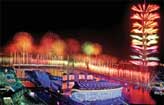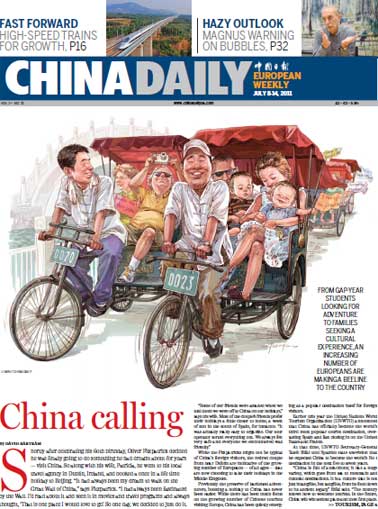Celebrities
Murdoch drops bid for British Sky Broadcasting
Updated: 2011-07-14 11:22
(Agencies)
LONDON - Rupert Murdoch's dream of controlling a British broadcasting behemoth has evaporated with the withdrawal of his bid for BSkyB — the latest, biggest casualty of what Prime Minister David Cameron called the hacking "firestorm" sweeping through British politics, media and police.
Cameron appointed a senior judge to lead an inquiry into the phone hacking and police bribery scandal engulfing Murdoch's British newspapers, and promised it would investigate whether Murdoch's reporters sought the phone numbers of 9/11 victims in their quest for sensational scoops.
"There is a firestorm, if you like, that is engulfing parts of the media, parts of the police, and indeed our political system's ability to respond," Cameron said Wednesday in the House of Commons.
"What we must do in the coming days and weeks is think above all of the victims ... to make doubly sure that we get to the bottom of this and that we prosecute those who are responsible," he said.
As lawmakers from all the country's main parties united to demand that Murdoch's News Corp. withdraw its bid for British Sky Broadcasting, the media magnate bowed to the inevitable, accepting that he could not win government approval for the multibillion dollar takeover.
"It has become clear that it is too difficult to progress in this climate," News Corp. deputy chairman and president Chase Carey said in a brief statement to the London Stock Exchange.
Shares in BSkyB fell 4 percent after the announcement, but rebounded as uncertainty about the company's immediate future was lifted and closed 2 percent higher.
Murdoch had hoped to gain control of the 61 percent of BSkyB shares that he doesn't already own. The takeover — potentially his biggest, most lucrative acquisition — appeared certain to succeed just over a week ago, despite concerns about the size of Murdoch's hefty share of the British media market.
But the deal unraveled with stunning speed after a rival newspaper reported that Murdoch's News of the World tabloid had hacked into the phone of teenage murder victim Milly Dowler in 2002 and may have impeded a police investigation into the 13-year-old's disappearance.
What had for several years been a trickle of allegations by people who claimed to have been hacked by the paper — from celebrities like Sienna Miller and Jude Law to politicians including former Deputy Prime Minister John Prescott — became a torrent. Potential victims swelled to include other child murder victims, 2005 London bombing victims and the families of dead British soldiers.
News Corp. responded by killing off the 168-year-old weekly newspaper, which published its final issue on Sunday. Murdoch flew to London in a desperate scramble to keep the BSkyB bid alive.
But still the allegations mounted. Former Prime Minister Gordon Brown claimed his bank details and the medical records of his young son, who has cystic fibrosis, had been obtained by other Murdoch papers.
The Daily Mirror newspaper, a rival to Murdoch's The Sun tabloid, claimed that a reporter for a Murdoch paper may have sought the phone numbers of victims of the Sept. 11 attacks in the United States.
Politicians from all parties, who for more than three decades have sought the approval of the Murdoch press, finally abandoned him.
"The terrible revelations of the last week have shaken us all," Labour Party leader Ed Miliband said in parliament Wednesday. "The events of the last seven days have opened all our eyes and given us the chance to say: It doesn't have to be like this."
Wednesday's debate centered on a motion declaring that Murdoch's bid for BSkyB would not be in the national interest. All three main parties had vowed to back the nonbinding motion.
The debate went ahead after Murdoch withdrew his bid, and the motion was approved without a formal vote, in a chorus of "ayes."
News Corp. lost several billion dollars in market value after the scandal broke last week, but its shares rallied after the company said Tuesday that it was buying back $5 billion of its own shares. Shares rose 71 cents, or 4.6 percent, to $16.06 in afternoon trading in New York.
For Murdoch, it was a dramatic reversal. For three decades, the Murdoch media empire has had near-mythic powers among British politicians to destroy careers and determine the result of elections. After the Conservatives triumphed in the 1992 election, the Sun blared in a front-page headline "It's the Sun wot won it" — and few doubted that it was true.
Steven Barnett, communications professor at the University of Westminster, said Murdoch's retreat signaled a new era in British political life.
"This means the British Parliament has discovered its spine," he said. "After 30 years of successive governments caving in to powerful media corporations, finally Parliament has realized it has to take a stand."
It was a bitter irony for Murdoch that it was the News of the World, his first British acquisition in 1969, that sabotaged his ambitions to control the nation's most profitable broadcaster.
Its ramifications for News Corp. and its executives — particularly Murdoch's son James, head of News Corp.'s European and Asian operations, and the chief of its British division, Rebekah Brooks — are still playing out.
The scandal claimed a senior casualty Wednesday as News International, the company's British unit, said its legal director, Tom Crone, had left the company. Crone led an internal inquiry that concluded only two people at News of the World had been involved in phone hacking — a stance that collapsed as numerous revelations tumbled out this year.
Cameron has struggled to control a spiraling scandal that includes his own former communications chief, Andy Coulson — an ex-News of the World editor — being arrested. The prime minister announced he was putting senior judge Brian Leveson in charge of an inquiry into phone hacking and alleged police bribery by the tabloid.
The inquiry will be able to compel witnesses — including government figures — to give evidence under oath.
Leveson will first investigate the culture, practices and ethics of the press, its relationship with police and the failure of the current system of self-regulation. The judge said the inquiry would begin "as soon as possible," but that its second phase, examining what went wrong at the News of the World, would have to wait until the criminal investigation is complete.
Police are pursuing two investigations of News International, one on phone hacking and the other on allegations that News of the World bribed police officers for information. Police have indicated the bribery investigations involve about half a dozen officers.
Detectives have arrested eight people so far in their hacking investigation, including Coulson. No one has been charged. Cameron said police had the names of more than 3,700 potential victims, and would be contacting them all.
The allegation that Murdoch papers may have targeted 9/11 victims comes from the Mirror, which quoted an anonymous source as saying an unidentified American investigator had rejected approaches from unidentified journalists who showed a particular interest in British victims of the terror attacks. It cited no evidence that any phone had actually been hacked.
In Washington, Sen. Jay Rockefeller, a Democrat from West Virginia, urged an investigation into whether News Corp. had violated U.S. law because of the British paper's activities.
If there was any phone hacking of Americans "the consequences will be severe," said Rockefeller, chairman of the Senate Committee on Commerce, Science and Transportation.
A report Wednesday in The Wall Street Journal, which is part of News Corp., said Murdoch met with advisers in recent weeks to discuss possible options, including the sale of his remaining British newspapers — The Sun, The Times and The Sunday Times. The Journal, citing unidentified people familiar with the situation, said there didn't appear to be any buyers given the poor economics of the newspaper division.
Meanwhile, some members of the Bancroft family that once controlled the Journal said they would have opposed selling the paper to Murdoch in 2007 had they known about the hacking allegations then. "I probably would have held out," Christopher Bancroft said in a story published by the nonprofit group ProPublica and British newspaper The Guardian. The story was written by a former executive of Journal publisher Dow Jones & Co.
A defiant mood was evident at The Sun, which slapped the headline "Brown Wrong" across its front page in response to the former prime minister's claims the paper had obtained confidential medical records of his 4-year-old son Fraser.
The newspaper insisted it learned of the boy's ailment from the father of another child with the same condition, and that it contacted the Browns, who consented to the story.
On Wednesday, Brown accused Murdoch's media empire of "lawbreaking often on an industrial scale."
Speaking in the House of Commons, he said victims saw "their private, innermost feelings and their private tears bought and sold by News International for commercial gain."
"News International descended from the gutter to the sewer," Brown said.
E-paper

Burning desire
Tradition overrides public safety as fireworks make an explosive comeback
Melody of life
Demystifying Tibet
Bubble worries
Specials

90th anniversary of the CPC
The Party has been leading the country and people to prosperity.

Say hello to hi panda
An unusual panda is the rising star in Europe's fashion circles

My China story
Foreign readers are invited to share your China stories.
